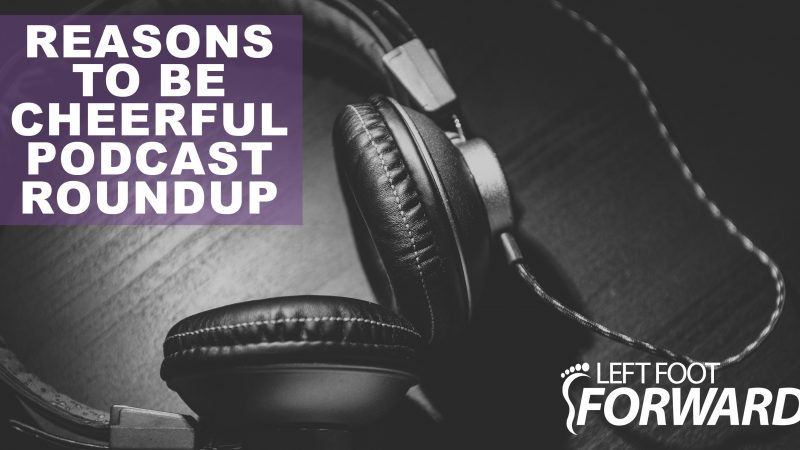A roundup of the Reasons to be Cheerful Podcast

The Reasons to be Cheerful (RTBC) podcast gives us much hope when it comes to dealing with some of the most pressing issues facing not only the UK but the wider world today. Brimming with ideas, the podcast, hosted by former Labour leader Ed Miliband and Geoff Lloyd, seeks to discuss ideas to help ‘fix the world.’
So we’ve decided to launch an LFF and RTBC collaboration!
For some in the present day and age, the politics of anger seems easier than the politics of answers, but this podcast is the opposite of that, charming, incredibly informative and funny! We’ll be doing a fortnightly roundup of the ideas discussed and five key things we’ve learnt from the podcast.
The latest episode of the podcast looked at the topic of how to respond to eco-anxiety in the face of climate change. While many of us have heard about the devastating impacts of climate change across the world, what we’re less familiar with is the psychological impact climate change has had too and what can be done to help. So, here are 5 takeaway’s from the latest episode.
1.Climate change is having a growing impact on mental health, especially on younger people
Climate change is having not only a physical impact on people, but also a psychological impact, which is particularly acute when it comes to younger people.
Dr Emma Lawrence from Climate Cares and also of Imperial College London, who features as a guest on this week’s podcast, says that growing up in what is an incredibly uncertain world right now, especially when it comes to the dangers of climate change is impacting all of us, especially younger people.
Dr Lawrence notes how the impacts of increased floods, wildfires, and the climate crisis combined with the inaction from people in power is causing high levels of distress.
Dr Lawrence says: “When you experience any form of disaster the number of people who are psychologically affected is up to 40 times the number of people injured so it’s a huge toll”.
Dr Lawrence adds that the early evidence shows it’s clear the climate crisis is having an effect on the psychological wellbeing of young people, citing a survey of 10,000 young people in countries around the world, with the majority saying they think humanity is doomed and that the future is frightening.
2. Interventions are available to help those with mental health difficulties caused by the climate crisis
So what tools are there to help those experiencing mental health difficulties as a result of the climate crisis? Dr Lawrence says that tools are available and that increasingly, mental health professionals are learning about anxiety caused by the climate crisis.
“At Climate cares we’re developing a co-designed self-guided journal for individuals to support them to process thoughts and feeling.” It was co-created with young people from around the UK and Dr Lawrence says there is now a need to help bring the tools developed by various organisations together.
3. Those with pre-existing mental health conditions are also affected by the climate crisis
Another interesting fact to emerge from the podcast is that the climate crisis is also causing impacts for those who already have pre-existing mental health difficulties.
Dr Lawrence highlights how during a heatwave for example, more people go to emergency centres with symptoms of mental illness but also how people with pre-existing mental health issues are more likely to die in a heat wave.
4. You can tackle both climate change and mental health at the same time
Having more green spaces, moving more, having a healthier and more varied diet, especially a plant based diet and changing our modes of transport will not only help the climate but will also help our mental health.
Asked if there were win-win opportunities for tackling both the climate crisis and improving mental health and wellbeing, Dr Lawrence said: “There are win-win opportunities …all of these things have really clear positive impact for our mental health and wellbeing.
5. We shouldn’t minimise the feelings of young people who are undergoing distress as a result of the climate emergency
Psychotherapist Steffi Bednarek who also features as a guest in the latest podcast says that there has been an increase in recent years in the number of clients seeking help for mental health difficulties caused as a result of the climate crisis.
What would Bednarek suggest for parents and teachers of children who are struggling mentally: “In the Climate Psychology Alliance we say it’s not a good idea to give young people the kind of reassurance that minimizes their feelings. It makes them feel more alone.” Instead Bednarek recommends that ‘it’s better to listen and let them know they’re not alone, say I’m worried about this too and you are not going to be alone in this, we’ll figure this out together and I don’t have the answer yet.”
Basit Mahmood is editor of Left Foot Forward
To reach hundreds of thousands of new readers we need to grow our donor base substantially.
That's why in 2024, we are seeking to generate 150 additional regular donors to support Left Foot Forward's work.
We still need another 117 people to donate to hit the target. You can help. Donate today.



